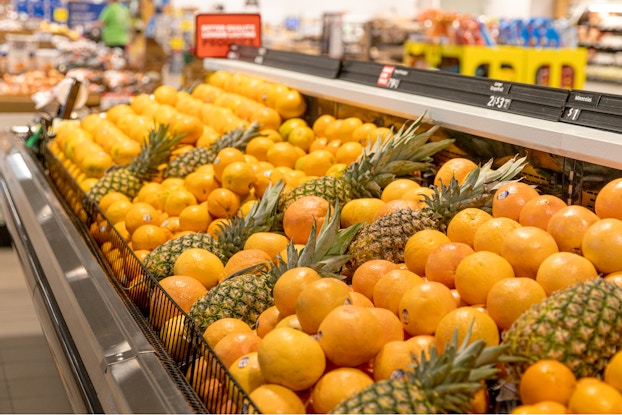
Schnucks Markets is hoping that technology can help strengthen its connections to the local farms in the areas where it operates.
The St. Louis-based grocery chain, which operates 113 Schnucks stores in Missouri, Illinois, Indiana, Wisconsin and Iowa, has begun working with Foodshed.io to find local farmers who can supply fruits and vegetables to its stores.
The tech platform provides a digital market where farmers can list the crops they have for sale. Institutional buyers, such as restaurants and supermarkets, can browse the offerings and place orders.
“While we have had a good presence with our local farmers in the area, we still see a large opportunity to expand that and build upon it,” Mike Tipton, vice president of produce at Schnucks Markets, told CO—. “I think there are a lot of other things that can be grown, and that are being grown in our area that we're not tapping into.”
The demand for locally sourced food can also be seen in the farm-to-table trend in the restaurant industry, whereby chefs are sourcing items directly from farmers, or in many cases, growing the items themselves on their own farms. In the food retail industry, consumer demand for locally sourced items has been gaining mainstream momentum for the past several years. Indeed, Walmart, the nation’s biggest retailer, has been expanding its mix of locally grown foods, as increasingly health conscious, everyday consumers seek fresher, higher-quality fare that’s also locally sourced.
The pandemic is now accelerating that demand.
It's the right thing to do because it's locally grown, and the customers want local produce.Mike Tipton, vice president of produce, Schnucks Markets
Sustainability
The pandemic has boosted the consumer desire toward buying products that are local and sustainable. Read on for ways you can make your business more sustainable.
“As lockdowns were implemented, consumers increasingly came to rely on and trust local and micro-local products, and in many instances, local has been the only source of available products,” according the Nielsen report, Recalibrating Consumption Dynamics in a COVID-19 Altered World.
“This has huge implications on retailers and manufacturers in terms of assortment in stores and production facilities to ensure multinational companies and local players can play to local strengths.”
The pandemic is also boosting the demand for local as consumers are more concerned than ever about contamination and product handling, according to the Produce Marketing Association.
“Consumers are guarded about imports and non-packaged fruits and vegetables so we need to make sure the local produce is available in store,” the association said in a recent blog post. “It’s more important than ever for consumers to have access to local food and stimulate local economies.”
Solving the local-sourcing challenge
While the demand for locally grown food in the grocery segment is clear, meeting that demand is quite another thing. It can be difficult to find and form connections with all of the smaller farmers in Schnucks’ operating areas, Tipton said. In addition, it can be time-consuming to match the output of these local growers with the needs of the entire regional chain, while ensuring that they are also meeting Schnucks’ standards for quality and food safety.

“When you're a produce buyer sitting behind the desk today, it's really easy to pick the phone up and call Florida or California and say, “Give me a truck load of peppers, or a truckload of broccoli,’” he said. “When you're working with multiple local growers, it takes a lot more time to find all the cases of produce that you need.”
Schnucks also needs to be able to depend on having a reliable supply, which can be challenging when juggling multiple, small orders. Tipton wants to provide the local items customers want, but he doesn’t want to dissatisfy them by displaying empty shelves where the local growers came up short.
“The last thing you want to do is to have the stores running out of green bell peppers … when we could have bought a whole truckload from Florida to stay in stock,” he said.
Test and learn with an eye toward expansion
In addition to identifying local farmers and creating a market for their yields, Foodshed also works with them to make sure that farms meet all of the food safety requirements and other certifications that Schnucks Markets requires from its suppliers. That has the potential to save a lot of time of effort on the retailer’s part, Tipton said.

Foodshed also uses blockchain technology, which allows food to be traced back to its source and has been touted as a potential resource during food safety crises.
Tipton said he is testing the waters with Foodshed on a small scale this year to get a feel for how the platform works. Schnucks is sourcing several produce items from local farmers through Foodshed, including lettuce, tomatoes, peppers, cucumbers, zucchini, squash, corn and microgreens.
Some items are currently being purchased for just a small number of stores, but Tipton said he hopes to expand the retailer’s relationships with many of those local farmers next year. He described an example in which a local farmer might be able to supply 300 cases of bell peppers this season, but Schnucks actually needs 600 cases.
“Next year, we want to be able to sit down early, before that farmer plants, and tell them what our needs are, week by week, and ask them to fulfill those needs so we can keep the pipeline to the stores [going],” said Tipton.
He anticipates that Foodshed will help bring more suppliers to the table so that the retailer will be able work with more local farmers to fill out more of its needs. He also said the program could expand beyond produce to include other items, such as honey.
“It's the right thing to do because it's locally grown, and the customers want local produce,” Tipton said. “So it's in our best interests to find the best avenue in order to deliver that to our customers. That’s why we think it’s important to work along with Foodshed to be a leader in offering local produce in our markets,” Tipton said.
“I want to be able to offer to our customers the maximum amount of local produce possible while it's available in our area,” he said. “That way, we will have the freshest food, and customers will know where to find it. And, it keeps the money local in our area, and keeps the whole economy turning in our region.”
- Barbara Thau contributed to this story.
CO—is committed to helping you start, run and grow your small business. Learn more about the benefits of small business membership in the U.S. Chamber of Commerce, here.

What can membership do for your business?
Gain tools to stay informed, competitive, and connected by becoming a U.S. Chamber of Commerce member. Membership gives you direct access to expert policy insights, economic updates, and exclusive resources designed to help your business thrive. From behind-the-scenes analysis from D.C. to exclusive discounts and expert support, U.S. Chamber membership helps you navigate change and seize new opportunities.







